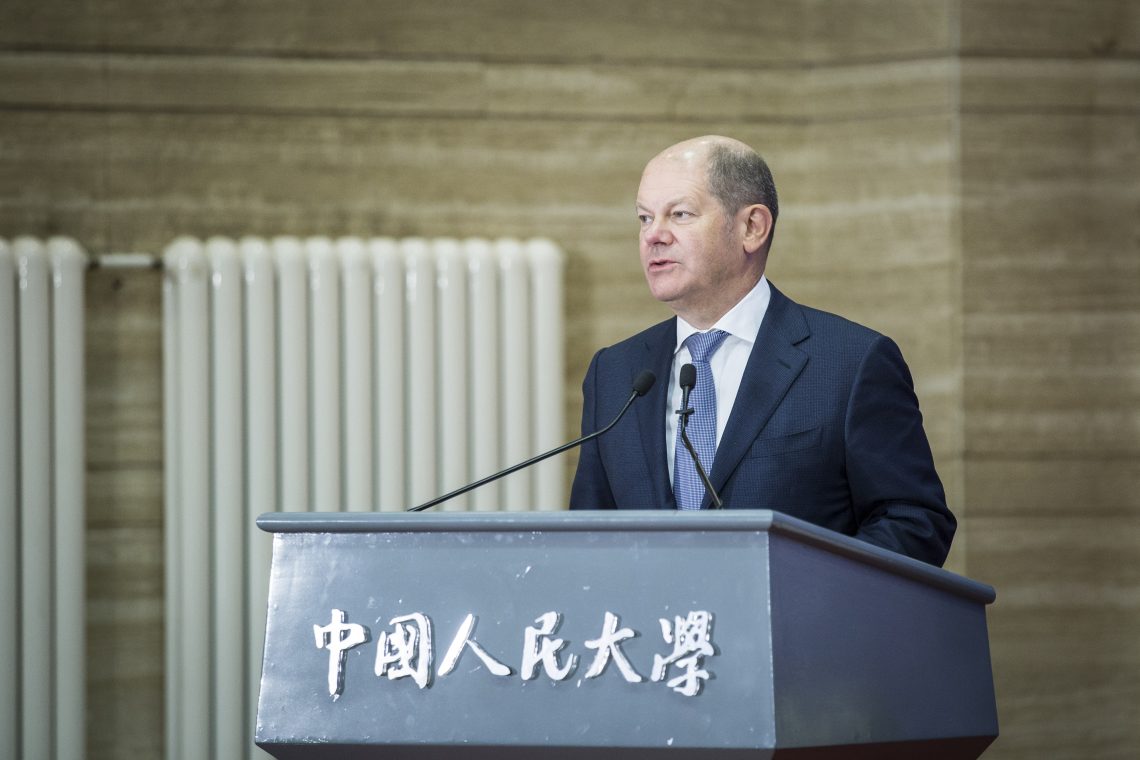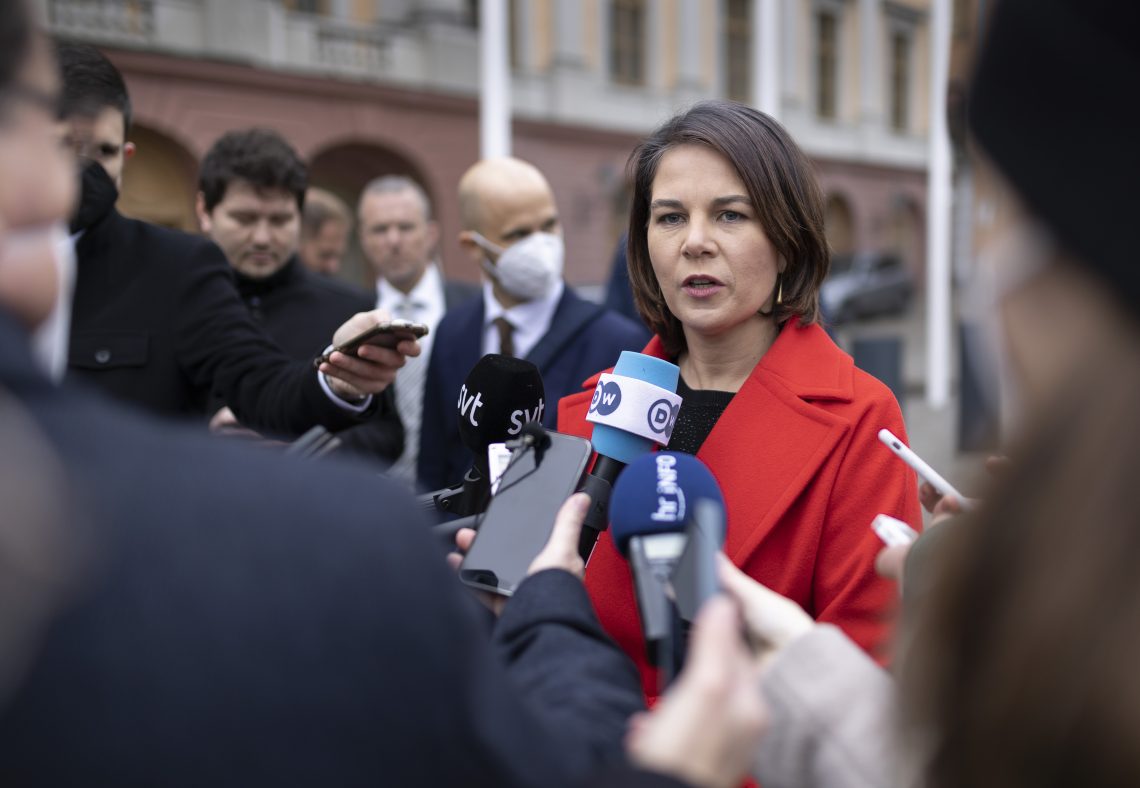Will there be a paradigm shift in Germany’s China policy?
There are some signs that Germany’s new ruling coalition will depart from former Chancellor Merkel’s pragmatic approach to China, but Beijing will continue to go to great lengths to maintain its economic and diplomatic ties with Berlin.

In a nutshell
- Beijing hopes for stability in Chinese-German relations
- Factions of the new government have a different agenda
- China issues will test Chancellor Scholz’s leadership abilities
When Olaf Scholz was officially elected Federal Chancellor of Germany on December 8, Chinese President Xi Jinping was prompt to send him a congratulatory message. In recent years, China has rarely responded so quickly to the election of Western heads of state. The gesture shows the power transition in Berlin is at the forefront of the Chinese leader’s attention.
China needs Germany
In his congratulations to Olaf Scholz on his election as German chancellor, President Xi said, “I attach great importance to the development of Sino-German relations.” This statement carries particular weight given the current tensions between China and the United States. China is Germany’s largest trading partner, and its second-largest export market after the U.S. For all these reasons, Mr. Scholz is inclined to stick to the Merkel-era pragmatic, pro-China policy.
To realize his “Chinese Dream” slogan, Xi Jinping wants to preserve China’s manufacturing strengths on the one hand and on the other accelerate the technological renewal of the manufacturing industry with the help of foreign companies (for example, by localizing their research and development). In this regard, German companies will undoubtedly continue to contribute – provided that they remain in China.
Beijing also needs Berlin on the diplomatic front. Germany’s China policy over the past 16 years has to a great extent shaped the European Union’s policy as well. Although the EU has been emphasizing efforts to speak with one voice on matters concerning China, Chancellor Merkel did not make any serious efforts to this effect, and the European Commission has not been able to adopt a tough and coherent stance. As a result, China had enough leeway to divide and conquer, with some European countries like Hungary, now openly singing Xi Jinping’s praises. The Chinese Communist Party is also able to ignore or defy EU institutions and strike back at “unfriendly” EU member states like Lithuania, which recently began trade relations with Taiwan.
German politics, especially under Ms. Merkel, have long been deeply intertwined with economic matters.
Beijing has been using every trade trick in the book to make Lithuania suffer for its relations with Taiwan. Such retaliation led Vilnius to ask the European Commission to intervene. But Xi Jinping believes the fragmented and weak EU leadership will continue as long as Germany sticks to the pragmatic approach of the Merkel era. Faced with Beijing’s aggressive coercion not only against Lithuania, but also German companies, the Scholz cabinet has so far kept silent.
Ruffling Beijing’s feathers
The new German government is often called the traffic light coalition because of the respective red, yellow and green colors of the Social Democrats, the Free Democratic Party and the Greens. The latter party is openly disliked by Chinese officials because its members often criticize Beijing on raw issues for the Chinese Communist Party, like human rights matters.
But the Free Democratic Party has also ruffled feathers in China. The Friedrich Naumann Foundation, which is close to the party, tried to set up a branch in China a few years ago, like other German parties’ foundations. However, it could not find a Chinese partner who would guarantee its political correctness. As a result, it had to set up a branch office in Hong Kong. And after Xi Jinping’s crackdown last year, the political climate changed dramatically, and the foundation had to close its operations there.
Under Ms. Merkel, both the Greens and the Free Democratic Party were in the opposition, so their influence on policy was limited. But now they will have more leeway to shape Germany’s foreign policy.

Push for change on China policy
Annalena Baerbock, co-leader of the Greens and Germany’s new foreign minister, has repeatedly stressed that the China policy of her ministry will be values-oriented. She has frequently criticized the Merkel government for being too soft on China and is expected to take a tougher line on a range of issues, especially human rights.
It is conceivable that the Biden administration is pleased with the appointment, as it could give the Democratic camp a new ally. Ms. Baerbock has vowed to strive for a more cohesive EU policy, and many expect a shift in the Union’s tone on foreign matters, especially toward China.
Finance Minister Christian Lindner of the FDP has also expressed dissatisfaction with the previous government’s China policy, saying that “it is not possible to copy it.” In a cabinet with a number of Greens and liberals as ministers, there will be many advocates of a tougher approach to China. But Chinese officials have already anticipated the issue, and they have purposely warned individual German politicians not to overemphasize tensions between the two countries and the so-called systemic competition between China and the West.
Hurdles to consensus
When it comes to China, the new German government is faced with several challenges. One is the lack of unity within the cabinet. According to the German weekly Wirtschaftswoche, in October Olaf Scholz assured President Xi that he would follow along the lines of Chancellor Merkel’s pragmatic line, and that he would support the EU’s investment agreement with China. But Mr. Scholz knows that the Greens and the FDP see things differently. His assurances to Beijing may have been premature, and it will be a test of his leadership skills whether he can make the cabinet reach a consensus on China policy.
Xi Jinping’s hopes for “business as usual” with Germany will certainly be dashed.
The second challenge is whether Ms. Baerbock, who has never served in the federal government before and suddenly finds herself foreign minister, will be able to deal with her counterparts, who are seasoned diplomats. Xi Jinping, like Russian President Vladimir Putin, is a difficult character to handle without a certain measure of diplomatic talent.
The third challenge is that German politics, especially under Ms. Merkel, have long been deeply intertwined with economic matters – perhaps even held hostage, when it comes to China. The country still plays a pivotal role for the German business community today, and it is uncertain whether the new government will be able to regain the upper hand in this game. It would have to successfully diversify the German economy, especially the supply chain, in four or five years as promised rather than rely heavily on China like now.
The last challenge is whether Germany, as one of the driving political forces in the EU, can and will really promote coherence and consensus in the Union’s policy toward China.
Scenarios
According to the coalition agreements, the three parties in the government have agreed to come up with a “comprehensive China strategy” as part of the joint EU-China policy, “to be able to realize our values and interests in the systemic rivalry with China.” This has already put pressure on Olaf Scholz, who is perceived in China as a loyal Merkel follower who will stick to his predecessor’s playbook.
At the same time, a chancellor, by definition, has to set the tone in foreign policy. According to the German Basic Law, he or she determines the guidelines for government policy. The outcome will depend not only on the power games between the three parties within the cabinet, but also on whether Olaf Scholz has the will and ability to set the course of the country on the world stage.
There are some signs that Mr. Scholz will use his executive purview to keep control of foreign policy. Rolf Mutzenich, leader of the Social Democrats in the German parliament, said in December last year that the coalition would pursue “a smart foreign policy that above all will be driven by and conceived in the chancellery.”
There are also signals that the coalition parties will make compromises while designing a new China policy. This would probably result in a somewhat tougher line, but not in an entirely different approach. In other words, Ms. Baerbock and Mr. Lindner will have to articulate their China policy carefully while Mr. Scholz will cautiously make use of the executive powers to balance the relations within the cabinet. Nevertheless, conflicts within the cabinet will be unavoidable.
The new German government under Chancellor Scholz will soon be under U.S. pressure for Berlin to line up behind Washington. Germany’s reaction to Washington’s diplomatic boycott against China’s Winter Olympic Games this year was the first test. Washington is already impatient with Berlin’s ill-defined stance toward Beijing. Senior members of the National Security Council have recently informed their German counterparts that they would see a return of U.S. unilateralism if Scholz’s cabinet did not signal their readiness to work with Washington on China by the midterm elections in November.
In short, Xi Jinping’s hopes for “business as usual” with Germany will certainly be dashed. But the world will have to wait and see to what extent exactly relations between the two countries will be reconfigured. This will be a decisive year: Germany’s long-awaited “China strategy” will finally be revealed.







